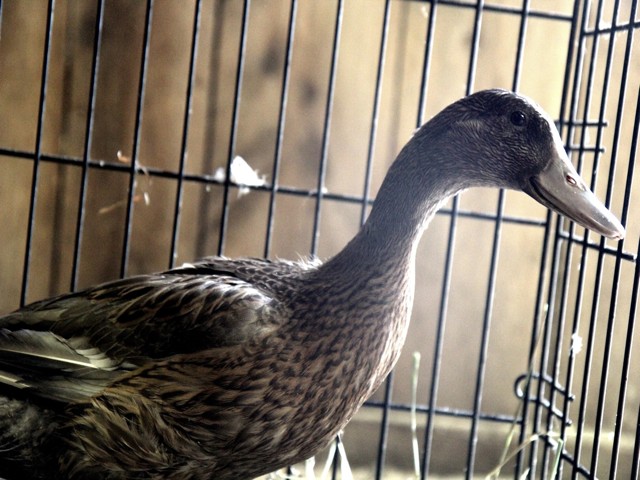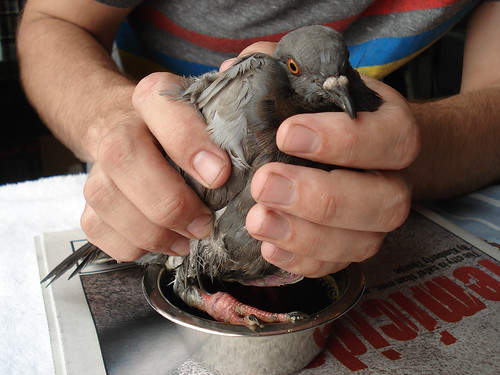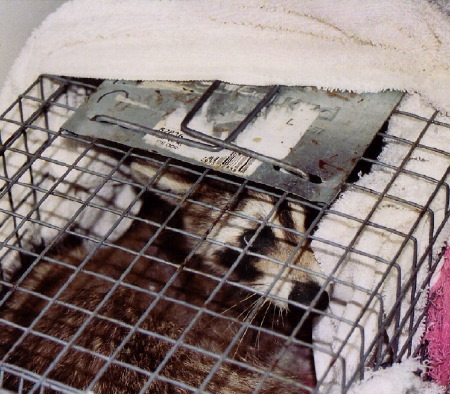ECC NEWS » Category » Rescue
Gothamist covers ECC rescue of slaughterhouse duck
January 25, 2014
On January 21st, Gothamist featured the work of Empty Cages and one of our newest friends: "A plucky duck escaped her dinner plate fate last week by fleeing the Bushwick poultry market where she had been confined. The handsome brunette is believed to have broken free from her cage at Doubau Live Poultry on St. Nicolas Avenue, seeking refuge behind a nearby building amidst "garbage and dead Christmas trees" for nearly a week before animal rescue group Empty Cages Collective were tipped off to the refugee's hiding place. "The duck was starved and dehydrated when we finally got to her," the non-profit tells us. "But she should make a full recovery." Instead of the cramped, hectic and deadly atmosphere of the slaughterhouse, the duck will live out her days at the Indraloka Farm Animal Sanctuary in Pennsylvania, a farmed animal sanctuary run by a group of vegans, naturally. There she'll frolic in the fields free from fear with the likes of Lucy the flightless goose and Sheba the pea hen. Quite the upgrade!"
Saving Bubba!
May 30, 2010
Bubba the little baby pigeon was brought to Manhattan Animal Care & Control by a member of the public. He was scheduled to be killed since none of the other pigeon rehabilitators was calling ACC back--and ACC wanted him out by the end of the day. Luckily for him, ECC rescued him from ACC and is currently caring for him! He will be released back into the "wilds" of Williamsburg, Brooklyn very soon! Please contact ECC if you are willing to be an emergency contact transporter to help with picking up animals from places where they are in trouble or to help with transport to and from our veterinarians. This is an important job that we always need help with! (Photo by Jessica Bruah).
ECC Rescues West Village Roosters!
January 22, 2010
 One of the roosters Empty Cages Collective rescued from Laguardia Corner Gardens in the West Village. This young man had a severe respiratory infection that required antibiotics when we received him!
One of the roosters Empty Cages Collective rescued from Laguardia Corner Gardens in the West Village. This young man had a severe respiratory infection that required antibiotics when we received him!Empty Cages Collective (ECC) has been called on repeatedly to rescue abandoned hens and roosters throughout New York City. A handful of the most recent rescues were abandoned at Laguardia Corner Gardens in the West Village.
Rescuing these birds is resource intensive for ECC, since we often need to transport the birds far distances to well-run farmed animal sanctuaries where the birds will never be at risk of being harmed again (through abandonment, being eaten, bred, fought, etc.).
The New York Times recently reported on our simple request to the people abandoning the birds at Laguardia Corner Gardens: Stop. Chickens, like all animals deserve to be treated with compassion and respect - and should not be abandoned any more then they should be abused on factory farms, fought in cockfighting rings, or otherwise cruelly treated.
ECC Helps Ailing Red-tailed Hawk on Christmas
December 31, 2009
Empty Cages Collective is always busy - even on December 25th, Christmas day. We were called by staff at Manhattan's Animal Care & Control (ACC) to assist with an injured Red-tailed Hawk who they didn't know how to handle properly. ECC volunteers quickly flew into action to pick up the ailing bird and transport her to a Federally-licensed raptor rehabilitator in Long Island. When we arrived at ACC, we realized they were housing the debilitated bird inappropriately (wire cages), so we quickly moved her into a hard, covered animal carrier. Injured and orphaned wild birds should never be transported or kept in wire cages because they can do severe damage to their feathers and faces which impedes their ability to be eventually released. For tips on how to handle injured hawks, in case you should ever encounter one, check out the tips offered by The Raptor Trust, Hawk Haven, or the University of Minnesota's Raptor Center. In any case, within a few minutes at ACC, ECC volunteers were on their way to get the young hawk some help!
After transporting the juvenile red-tailed hawk to a raptor rehabilitator, a ECC volunteer quickly drafted a letter to officials at ACC asking, in part: "Can a policy be instituted for medical staff and everyone at ACC handling wild birds that the birds are kept in solid boxes or carriers, and are kept warm, dark and quiet until they are transported to rehabilitators or veterinarians? A wild bird's chances of rehabilitation and release back into his or her habitat should be improved by his or her run-in with ACC, not impeded. I have included a picture of the hawk as I found her - if you look closely enough you can see her tail feathers becoming ragged from rubbing against and through the cage." We have been given assurances that distressed raptors will be handled better in the future.
The better news is, the Red-tailed Hawk is likely to recover and will eventually be released back into the wild where she belongs!
After transporting the juvenile red-tailed hawk to a raptor rehabilitator, a ECC volunteer quickly drafted a letter to officials at ACC asking, in part: "Can a policy be instituted for medical staff and everyone at ACC handling wild birds that the birds are kept in solid boxes or carriers, and are kept warm, dark and quiet until they are transported to rehabilitators or veterinarians? A wild bird's chances of rehabilitation and release back into his or her habitat should be improved by his or her run-in with ACC, not impeded. I have included a picture of the hawk as I found her - if you look closely enough you can see her tail feathers becoming ragged from rubbing against and through the cage." We have been given assurances that distressed raptors will be handled better in the future.
The better news is, the Red-tailed Hawk is likely to recover and will eventually be released back into the wild where she belongs!
ECC Helps 16 Budgies Fly Away From A Bad Situation
December 7, 2009
Working in conjunction with the Mayor's Alliance for NYC's Animals and the Avian Welfare Coalition, Empty Cages Collective (ECC) assisted with a rescue situation involving 16 budgies who had been denied proper veterinary care. had been bred and were now unwanted by their "caretaker."
ECC helped coordinate and organize the actual rescue of the budgies, as well as provided temporary foster care until the beautiful birds could be transported to a sanctuary where they would no longer be denied proper care, bred, or otherwise harmed. In fact, in their new home they will have a huge aviary where they will be able to fly freely - something all birds want and deserve.
Empty Cages Collective believes all naturally wild birds - from budgies to macaws to lorikeets - deserve to live freely in their native habitats and not be imprisoned in cages as "pets". Until such a day arrives, ECC will continue to do what we can to assist, place and advocate for the avian refugees of the exotic pet trade.
ECC helped coordinate and organize the actual rescue of the budgies, as well as provided temporary foster care until the beautiful birds could be transported to a sanctuary where they would no longer be denied proper care, bred, or otherwise harmed. In fact, in their new home they will have a huge aviary where they will be able to fly freely - something all birds want and deserve.
Empty Cages Collective believes all naturally wild birds - from budgies to macaws to lorikeets - deserve to live freely in their native habitats and not be imprisoned in cages as "pets". Until such a day arrives, ECC will continue to do what we can to assist, place and advocate for the avian refugees of the exotic pet trade.
Saving Gidget
October 13, 2009

Gidget gets some fresh air at Coming Home Animal Sanctuary
Empty Cages Collective volunteers are confronted daily with this culture's exploitation and abuse of other animals. However, we are also inspired by the resilience and beauty of animals who escape terrible situations to a find a place in a world where they are no longer bombarded with human inflicted suffering and a looming premature death. Gidget is one of the many beings who reminds us of why we work so hard to help animals victimized by human indifference,
cruelty, greed, and callousness.
Gidget, a proud red hen, escaped a live poultry market - through luck or purposeful action - in Brooklyn with one of her fellows. Live poultry markets (video of one of NYC's markets can be seen here) are places scattered all over the five boroughs where chickens, ducks, turkeys, rabbits and other animals live in intensive confinement before being brutally slaughtered for human consumption.
In any case, the escape of Gidget and her friend was most likely the first time either of them were able to spread their wings, move about freely, and forage (with difficulty) for food. Unfortunately, freedom was short lived for Gidget's friend as she was soon hit by a car and killed. Luckily for Gidget, a kind man took her into his yard to avoid her meeting a similar fate and kept her there until he could find somewhere safe for her to go. Eventually, the man contacted Empty Cages Collective and asked for our assistance.
For several weeks, Gidget lived at our shelter space - enjoying treats of lettuce and kale and entertaining (and sometimes chasing) our adoptable cats and kittens. Eventually, a wonderful sanctuary called Coming Home Sanctuary stepped forward to provide a lifelong home for Gidget (now known as Rosie). Gidget is now strutting her stuff in the country, enjoying sunshine, dust bathing, and delicious greens as treats.
Please remember that most farmed animals aren't as lucky as Gidget and never get the opportunity to escape their abuse. The best way to take a stand against farmed animal abuse is to consume a plant based diet free of meat, dairy products or eggs.
Gidget, a proud red hen, escaped a live poultry market - through luck or purposeful action - in Brooklyn with one of her fellows. Live poultry markets (video of one of NYC's markets can be seen here) are places scattered all over the five boroughs where chickens, ducks, turkeys, rabbits and other animals live in intensive confinement before being brutally slaughtered for human consumption.
In any case, the escape of Gidget and her friend was most likely the first time either of them were able to spread their wings, move about freely, and forage (with difficulty) for food. Unfortunately, freedom was short lived for Gidget's friend as she was soon hit by a car and killed. Luckily for Gidget, a kind man took her into his yard to avoid her meeting a similar fate and kept her there until he could find somewhere safe for her to go. Eventually, the man contacted Empty Cages Collective and asked for our assistance.
For several weeks, Gidget lived at our shelter space - enjoying treats of lettuce and kale and entertaining (and sometimes chasing) our adoptable cats and kittens. Eventually, a wonderful sanctuary called Coming Home Sanctuary stepped forward to provide a lifelong home for Gidget (now known as Rosie). Gidget is now strutting her stuff in the country, enjoying sunshine, dust bathing, and delicious greens as treats.
Please remember that most farmed animals aren't as lucky as Gidget and never get the opportunity to escape their abuse. The best way to take a stand against farmed animal abuse is to consume a plant based diet free of meat, dairy products or eggs.
Marcos Gets A Helping Hand!
October 9, 2009
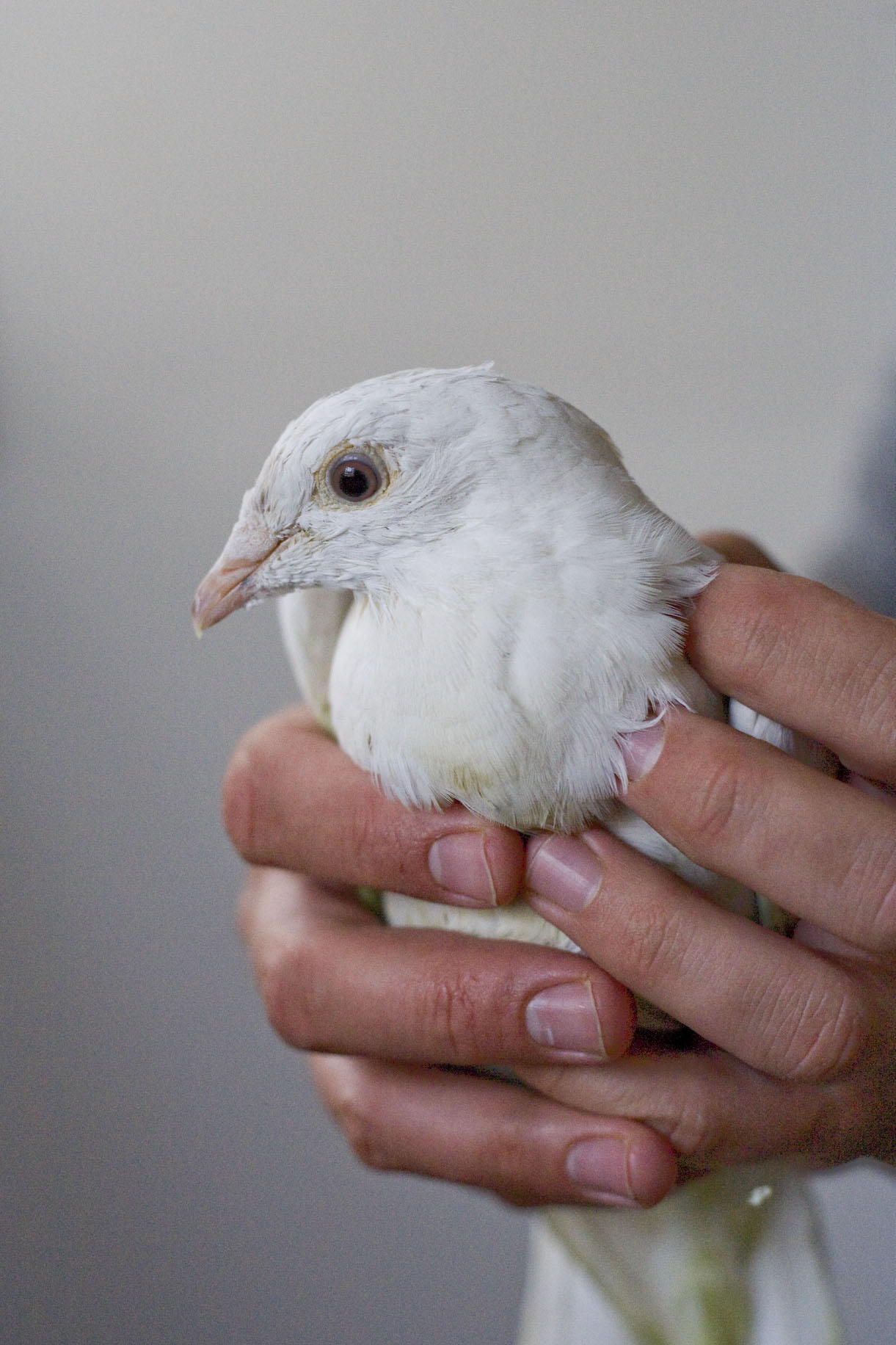
Marcos gets a helping hand from ECC
Marcos, an injured pigeon, was one of the animals rescued this week by ECC. Staten Island's Animal Care & Control contacted us about a pigeon that they were going to kill due to injuries he sustained when attacked by an animal. Luckily for Marcos, we agreed to take him into our wildlife rehabilitation project and have him seen by one of our avian veterinarians. Although Marcos has a handful of wounds all over his body, our veterinarian believes he will make a full recovery with the help of some pain medication, antibiotics and TLC. We hope the day is soon coming when all animal care establishments take the extra step to preserve life and alleviate suffering by reserving euthanasia for only animals who are truly irrepairably suffering.
ECC Needs Your Help To Rescue & Protect Urban Squirrels
October 8, 2009

 Photos courtesy Jesse Bruah
Photos courtesy Jesse BruahAs some of you know, Empty Cages Collective was inundated with orphaned baby gray squirrels this fall. These babies were orphaned when their nest trees were cut down, when their mothers were hit by cars or indiscriminately poisoned with cruel anticoagulant poison intended for rats, or otherwise left motherless by the actions of thoughtless or cruel people. Many of the orphaned babies were "pulled" from Animal Care & Control where they were at risk of being unnecessarily killed. Others were rescued by the general public and brought to us for rehabilitation and eventual release. Through tireless dedication by our all-volunteer staff, most of the babies survived their hardships and thrived! We are now preparing for the moment we've all been waiting for - their return back to the outside world as free-living wild animals!
When rehabilitated gray squirrels are released back into the wild, a nest box needs to be placed in the area (one nest box per squirrel) at the release site so as to help the babies adjust to living the wild life. Empty Cages Collective is in desperate need for people to donate money to our wildlife rehabilitation efforts, as well as carpentry skills (or friends with carpentry skills) to help us build squirrel nest boxes. We are also in need of donated wood - as we would prefer to use recycled wood fiber left over from other projects instead of buying new as some of the squirrels we have were orphaned when their nest trees were cut down.
You can see some of the examples of squirrel nest box plans (one, two, and three) if you think you'd like to try your hand at donating some squirrel nest boxes to our ongoing wildlife rehabilitation efforts. Otherwise, please send your much needed financial contributions to us via paypal (our email address is: emptycagescollective@gmail.com) or through check or money order to our mailing address: Empty Cages Collective, 302 Bedford Avenue, PMB: #301, Brooklyn, NY 11211.
When rehabilitated gray squirrels are released back into the wild, a nest box needs to be placed in the area (one nest box per squirrel) at the release site so as to help the babies adjust to living the wild life. Empty Cages Collective is in desperate need for people to donate money to our wildlife rehabilitation efforts, as well as carpentry skills (or friends with carpentry skills) to help us build squirrel nest boxes. We are also in need of donated wood - as we would prefer to use recycled wood fiber left over from other projects instead of buying new as some of the squirrels we have were orphaned when their nest trees were cut down.
You can see some of the examples of squirrel nest box plans (one, two, and three) if you think you'd like to try your hand at donating some squirrel nest boxes to our ongoing wildlife rehabilitation efforts. Otherwise, please send your much needed financial contributions to us via paypal (our email address is: emptycagescollective@gmail.com) or through check or money order to our mailing address: Empty Cages Collective, 302 Bedford Avenue, PMB: #301, Brooklyn, NY 11211.
ECC Gives Mourning Doves Something to Be Happy About!
July 21, 2009
When people think of New York City, they don't think of wild animals. Yet many species of wild animals make a life for themselves here, eking out a living among the concrete, cars, noise and people. Unfortunately, because of the close contact wild beings and humans have in NYC, wild animals of all sorts often find themselves injured, orphaned or otherwise endangered. Empty Cages Collective has been called upon to assist wild animals who have been hit by cars, injured from human litter, poisoned, and otherwise harmed by human carelessness and indifference. Two of the species ECC has been called upon to help repeatedly are pigeons and their smaller cousins, mourning doves.
ECC is in the works of becoming a federally and state licensed wildlife rehabilitation organization so we can be of more service to urban wildlife in New York City. Mourning doves in the 5 boroughs have something to be a little less sad about!
ECC is in the works of becoming a federally and state licensed wildlife rehabilitation organization so we can be of more service to urban wildlife in New York City. Mourning doves in the 5 boroughs have something to be a little less sad about!
The same dove a few weeks later gets a meal of seeds as he gets closer to being released back into the wild!
Saving Rabina
February 19, 2009
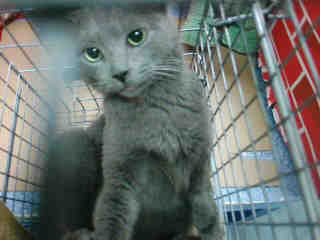
Rabina awaiting death or rescue at ACC
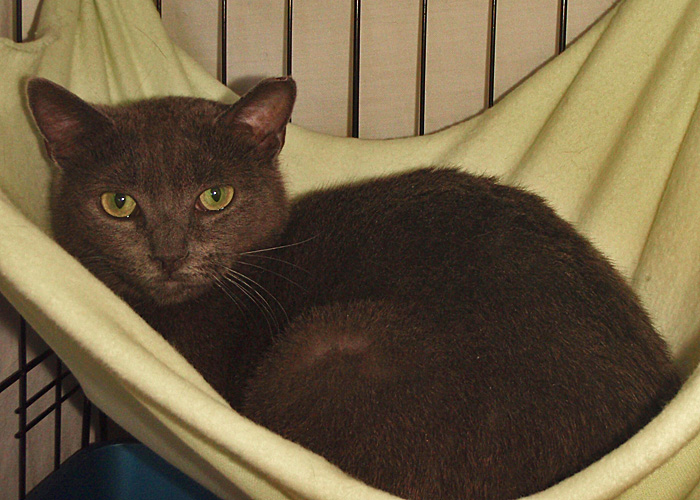
Rabina relaxing at the ECC Shelter Space
Rabina, while an individual with a unique personality and distinct biography, is typical of the cats who face death at animal control facilities nationwide. Rabina was a healthy adult stray cat surviving on the streets and in backyards in the Borough of Queens. Prior to entering into the NYC Animal Care & Control (ACC) system, she was your typical beautiful solid gray shorthaired cat. Her brush with unnecessary and premature death epitomizes the need for change in society in general, and the shelter establishment in particular.
She was trapped in a live trap on January 10th by a member of the public. The woman had seen Rabina stalking birds at her bird feeder and watched on as she killed a bird. The woman decided that allowing Rabina to continue on eking out a living in "her" neighborhood (and killing birds to survive) was unacceptable. She took her to ACC knowing it was likely she would be killed.
Don't get us wrong. Life wasn't always perfect for Rabina (as it isn't perfect for any of us), but it was hers: freedom, foraging, finding and hunting food, and living with her feral cat fellows in colonies. And a chance at a risk-filled life beats the guarantee of premature and unwanted death in the form of lethal injections.
In any case, after entering NYC Animal Care & Control, Rabina soon found herself on the New Hope List - a list showcasing the animals who would be killed the next morning for a variety of questionable reasons (space, suckling, treatable illness, behavior, etc.) We opted to rescue her to spare her unnecessary death. We decided to show her the compassion and understanding that the woman in Queens and the shelter system who would kill her had failed to. The goal for Rabina would be one of two outcomes: relocation to a protected, sterilized feral cat colony where a kind caretaker feeds and looks after the cats or an adopted home to call her own.
Lo and behold, Rabina ended up not being the un-socialized, "behavioral problem" feral cat she was reported to be, but a shy stray who enjoys sleeping in hammocks, pats on the head, eating canned food and quietly snoozing through the days awaiting her opportunity to find lasting love and a happy home. Let us know if you're interested or know someone who might be in giving Rabina the stable home all companion animals deserve.
She was trapped in a live trap on January 10th by a member of the public. The woman had seen Rabina stalking birds at her bird feeder and watched on as she killed a bird. The woman decided that allowing Rabina to continue on eking out a living in "her" neighborhood (and killing birds to survive) was unacceptable. She took her to ACC knowing it was likely she would be killed.
Don't get us wrong. Life wasn't always perfect for Rabina (as it isn't perfect for any of us), but it was hers: freedom, foraging, finding and hunting food, and living with her feral cat fellows in colonies. And a chance at a risk-filled life beats the guarantee of premature and unwanted death in the form of lethal injections.
In any case, after entering NYC Animal Care & Control, Rabina soon found herself on the New Hope List - a list showcasing the animals who would be killed the next morning for a variety of questionable reasons (space, suckling, treatable illness, behavior, etc.) We opted to rescue her to spare her unnecessary death. We decided to show her the compassion and understanding that the woman in Queens and the shelter system who would kill her had failed to. The goal for Rabina would be one of two outcomes: relocation to a protected, sterilized feral cat colony where a kind caretaker feeds and looks after the cats or an adopted home to call her own.
Lo and behold, Rabina ended up not being the un-socialized, "behavioral problem" feral cat she was reported to be, but a shy stray who enjoys sleeping in hammocks, pats on the head, eating canned food and quietly snoozing through the days awaiting her opportunity to find lasting love and a happy home. Let us know if you're interested or know someone who might be in giving Rabina the stable home all companion animals deserve.
Simon Says "Thanks!"
August 19, 2008
Sometimes for animals in need, it's about being in the right place at the right time.
A few days ago, two Empty Cages Collective (ECC) volunteers were returning from releasing (now spayed and neutered) feral cats back to their home colonies in Bushwick. When only a few blocks away from the recovery space, a little feathered body laying on the side of street caught one of their eyes. After closer investigation, it was became clear that the bird in question wasn't just resting - he needed help!
The poor pigeon, who we've named Simon, was badly injured. Simon's feet and legs were so severely entangled and embedded with trash in the form of string, he was unable to walk or stand. He was suffering immensely as the string constricted blood flow and was now responsible for an infection in his limbs. Poor Simon couldn't even manage to forage for food and was slowly starving to death from the entangled mess. It seemed when the ECC volunteers found him, he was just waiting to die ignored and alone.
Lucky for Simon, ECC volunteers quickly rescued him and took him to our avian veterinarian. Dr. Pilny was able to remove all of the litter from Simon's swollen feet. Now, he is receiving foot soaks in Betadine solution to help his wounds heal and some old-fashioned rest and relaxation. His prognosis for recovery is good and if all goes well, he should be able to return to the skies of Brooklyn very soon.
A few days ago, two Empty Cages Collective (ECC) volunteers were returning from releasing (now spayed and neutered) feral cats back to their home colonies in Bushwick. When only a few blocks away from the recovery space, a little feathered body laying on the side of street caught one of their eyes. After closer investigation, it was became clear that the bird in question wasn't just resting - he needed help!
The poor pigeon, who we've named Simon, was badly injured. Simon's feet and legs were so severely entangled and embedded with trash in the form of string, he was unable to walk or stand. He was suffering immensely as the string constricted blood flow and was now responsible for an infection in his limbs. Poor Simon couldn't even manage to forage for food and was slowly starving to death from the entangled mess. It seemed when the ECC volunteers found him, he was just waiting to die ignored and alone.
Lucky for Simon, ECC volunteers quickly rescued him and took him to our avian veterinarian. Dr. Pilny was able to remove all of the litter from Simon's swollen feet. Now, he is receiving foot soaks in Betadine solution to help his wounds heal and some old-fashioned rest and relaxation. His prognosis for recovery is good and if all goes well, he should be able to return to the skies of Brooklyn very soon.
Raccoon Rights
August 19, 2008
Navigating an urban environment and surviving is often no easy feat for wild animals like raccoons, opossums, squirrels and others. Cars, cruel humans, toxins, development, and intolerance all take their toll on the wild animals who refuse to allow civilization to get the better of them. Each interaction we have with wildlife leaves an opportunity to practice consideration, compassion and respect for our wild neighbors.
Unfortunately, on May 15th, the opportunity to forge a more compassionate attitude towards the creatures who share the five boroughs with us, was lost with the life of a sleepy raccoon. The New York Post reported in Coonskin Capped: E. Side Critter Killed By Cops that police officers attempting to capture a raccoon who was resting in a tree on the Upper East Side terrorized, injured, and eventually sent the raccoon to her death. After police severely injured the raccoon with darts (and joked about harpooning her in front of the public), the dazed animal was taken to Animal Care & Control where she was killed.
The need to capture a raccoon who was simply resting in a tree and showing no signs of abberant behavior is beyond questionable, it's silly. It's common for mother raccoons to be seen during the day - especially when they have young in the nest. The Empty Cages Collective was so distressed by the treatment of this raccoon that we fired off a letter to the editor to the New York Post trying to set the record straight. The letter read:
The recent handling and killing of the raccoon on the Upper East Side ( Coonskin Capped: E. Side Critter Killed By Cops - 5/16/2008 ) is beyond offensive. Raccoons are intelligent, sensitive creatures who deserve our admiration for successfully surviving in this concrete jungle, not abuse and violence.
Justifying unnecessary cruelty due to antiquated fears about rabies would be laughable if it wasn't so common. Healthy mother raccoons sometimes nap in trees or forage during the day when they have nursing and dependent young during this time of year. The officers didn't just "harpoon" a raccoon, but likely orphaned a litter of babies who will now die of starvation, dehydration or exposure for no good reason.
Raccoons and humans can coexist - even in New York City. Tolerance, understanding and thoughtfulness can help solve human/wildlife conflicts without bloodshed. The NYPD and Animal Care & Control would do well to start acting on that fact.
For the sake of the other raccoons who call NYC, we hope attitudes and policies evolve so wild animals don't continue to suffer and die unnecessarily due to fear and ignorance.
Unfortunately, on May 15th, the opportunity to forge a more compassionate attitude towards the creatures who share the five boroughs with us, was lost with the life of a sleepy raccoon. The New York Post reported in Coonskin Capped: E. Side Critter Killed By Cops that police officers attempting to capture a raccoon who was resting in a tree on the Upper East Side terrorized, injured, and eventually sent the raccoon to her death. After police severely injured the raccoon with darts (and joked about harpooning her in front of the public), the dazed animal was taken to Animal Care & Control where she was killed.
The need to capture a raccoon who was simply resting in a tree and showing no signs of abberant behavior is beyond questionable, it's silly. It's common for mother raccoons to be seen during the day - especially when they have young in the nest. The Empty Cages Collective was so distressed by the treatment of this raccoon that we fired off a letter to the editor to the New York Post trying to set the record straight. The letter read:
The recent handling and killing of the raccoon on the Upper East Side ( Coonskin Capped: E. Side Critter Killed By Cops - 5/16/2008 ) is beyond offensive. Raccoons are intelligent, sensitive creatures who deserve our admiration for successfully surviving in this concrete jungle, not abuse and violence.
Justifying unnecessary cruelty due to antiquated fears about rabies would be laughable if it wasn't so common. Healthy mother raccoons sometimes nap in trees or forage during the day when they have nursing and dependent young during this time of year. The officers didn't just "harpoon" a raccoon, but likely orphaned a litter of babies who will now die of starvation, dehydration or exposure for no good reason.
Raccoons and humans can coexist - even in New York City. Tolerance, understanding and thoughtfulness can help solve human/wildlife conflicts without bloodshed. The NYPD and Animal Care & Control would do well to start acting on that fact.
For the sake of the other raccoons who call NYC, we hope attitudes and policies evolve so wild animals don't continue to suffer and die unnecessarily due to fear and ignorance.
back to NEWS

